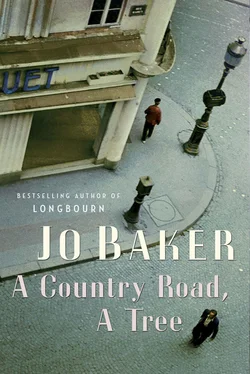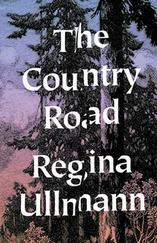“You’d look well.”
“You say that now, but just wait until—”
The clump of leather hitting the floor, one and then another. A sigh, followed by a wincing exploration of sore places, blisters.
“Anyway, we’re stuck here for hours. We know that much. I’m not keeping them on all that blessed time.”
—
Time passes slowly in confinement. Low conversations, card games, the drifting in and out of sleep; sunlight from a missing slate shafts across the floor, and softens, and goes blue.
He must have been sleeping, because there’s a sweep of night air across his face and a slice of starlight that narrows, shrinks and disappears, and he shuffles up on to elbows. He blinks into the dark. Suzanne’s already up beside him, properly awake.
“Is it—?”
“Hush,” she says. “I’m listening.”
The darkness seems fuller, more crowded. There’s a whiff of tobacco smoke, and then he spots the red coal of a cigarette and hears the voices speaking low, in the rolling wet accent of the region.
A match flares and for a moment there’s a devil’s mask, heavy-browed and creased, and the light grows and is touched into a lantern, and it glows on other faces too. These are the passeurs. They are nameless. They belong to this place like the local stone.
The lantern draws them from the dark — the girls, one of them limping and barefoot; her friends supporting her, their faces white; the old man, hunched and peering, scratching his groin; the young men approaching too, though wary as rabbits. Suzanne gets up, and he struggles to his feet, and they make their way towards the lamp, lame with wear.
“That’s too many. I’d no idea there’d be so many,” one of the passeurs is saying.
Around the lantern there’s a general sucking of teeth.
“We can’t take them all at once, not across the fields.”
“The girls can go in the car.”
“You’re kidding.”
“In the boot.”
“All three of them?”
“It’s a big boot. We put the dogs in there all the time.”
“They’re not dogs, though, are they?”
“No, but it’s not like it’s the middle of summer. They’re not going to suffocate.”
“He has a point. It’s not far.”
The three girls stand, just in the glow of the light, in their knee-length skirts and broken shoes. The barefoot one lists slightly to one side. They have their jackets wrapped tight round them, arms folded across hollow bellies.
“Do you particularly object,” a passeur addresses them, “to crossing the border in the boot of this idiot’s stinking old Citroën?”
The three of them look at him, long and blank. They’re barely more than schoolgirls. The barefoot one says, “That would be good.” And then the others nod along with her.
Devil-face then turns to his companions. “Well. There we are, then.” Then back to the girls: “Better get your things together, my darlings. You’re with him.”
—
The passeurs are barely there; they are never more than parts, they exist as synecdoches: a glimmer of moonlight caught on an eye, the turn of a profile against starlight, a pale strip of neck above a dark coat collar. The talk too is scraps and shreds and it drifts away like ashes. He can’t put any of it — either what he sees or what he hears — together. He can’t make this cohere.
They have been split into smaller groups like sheep by sheepdogs. The girls have curled themselves obligingly into the boot of the car; another party is heading further west across open country. There are patrols and posts on the roads, so their bunch is to go through the fields and cross where the border is more notional than concrete. It is a relief to be told what to do for a while. Not to have to make decisons. It is the relief of a pressure change, a different unease.
They pause at the field gate; the passeur says something, but it is not quite catchable: a flash of teeth, then this, which he does catch: “Stay low, tread softly, keep quiet.”
Then the fellow slips into the darkness and they follow. The ground is rough. The passeur keeps slipping in and out of sight, as if he is a magic trick: now you see him, now you don’t. It makes the heart lurch and hammer, makes the senses strain. Then there’s movement, and there he is again, and the skin flushes and the nerves sing out. And underneath it all is the insistent throb of disquiet, of what do we know about any of this, after all? He could be taking us anywhere, he could melt away at any moment. He could lead us right to the Gestapo for the money and the pleasure of watching the arrest. If one man can do a thing like that, so could another. It has become, after all, something that people do.
He is thinking this as he shuffles along, bent almost double, creeping like a toad in the shadow of a hedge. Suzanne, ahead, is a low and silent shape; he can’t even hear her footsteps. There is a blond expanse of stubbled field to his left. When a foot strays off the worn-bare path, the cropped stems prod and spike his boot soles. It is a useful reminder of the straight and narrow.
At the corner of the field, they scramble through a gap in the hedge. Beyond, the world is different: the Indian corn still stirs uncut in the breeze, whispering and musty. The path continues on, a narrow pass between the stems.
“…silence absolute…,” the passeur is saying. “…close now…”
He is ushering them by; he brings up the rear, and it’s worse then, the sense of fumbling blindly into darkness, through the dry stalks, into who knows what.
Footfalls. The sound of boots on a metalled road. There’s torchlight broken into bits by the wicker-weave of the hedge. They hunker low, silent, breath heaving; and then the boots go crunching on, and the light is past and gone.
His heart hammers. His breath is shallow and it hurts. The passeur makes a low sound, impatient, subtle, and so they creep on. And everything now seems condensed; everything seems bristling and stark. The grey silk of the corn, the creak of boots, the night air on his face, the smell of rot, the stars above. His calves ache, his thighs ache. Night birds call, clouds bundle across the sky. Down in the mud, they edge onwards, creeping towards a different, deeper darkness.
The little party huddles up against a fence; branches creak in the wind. Whispered instructions: they climb the fence in turn, and on the far side gather under the cover of the trees. No moonlight here; pitch black. With a click of the tongue, the passeur leads them off again, this time walking upright along what seems to be a proper path, instinctually known. It is strange to go upright now. The eyes adjust; he can pick out branches against the sky, slender tree trunks.
But then off to the left, there’s movement, noises. He stops, bristling, breath caught, and then it’s just rustling, snuffling. A badger, or a hedgehog perhaps, making its way through the fallen leaves. And they carry on, treading through the darkness, hands raised against the whip of unseen branches, moving through an entirely different world.
Then the darkness begins to thin; tree trunks are grey against the sky, and the passeur ’s shape moves across the lightness, and then Suzanne’s, and they are out at the far edge of the woods. A stream murmurs to itself; it catches moonlight. Single file, they follow its course upstream, walking between the woods and the water. On the far bank lies the open countryside of the Free Zone.
He sees the moon’s reflection on the water. The white disc struggles to disperse and then shivers itself back together, then breaks apart again. He slows, stands, watches. The stone, the water, the moon; he sees himself like Friedrich’s painted men, transient, contemplating the enduring, changing, ancient moon. But he is staring downward here, not up towards the heavens. He closes his eyes.
Читать дальше










